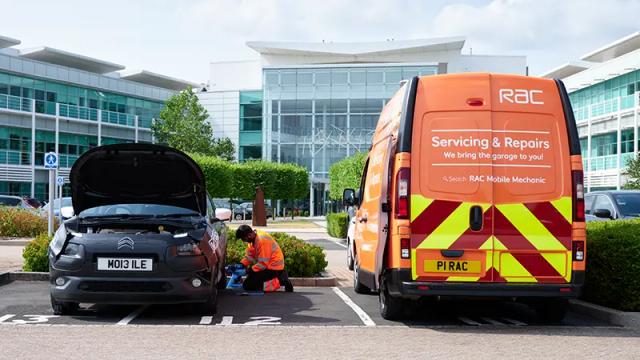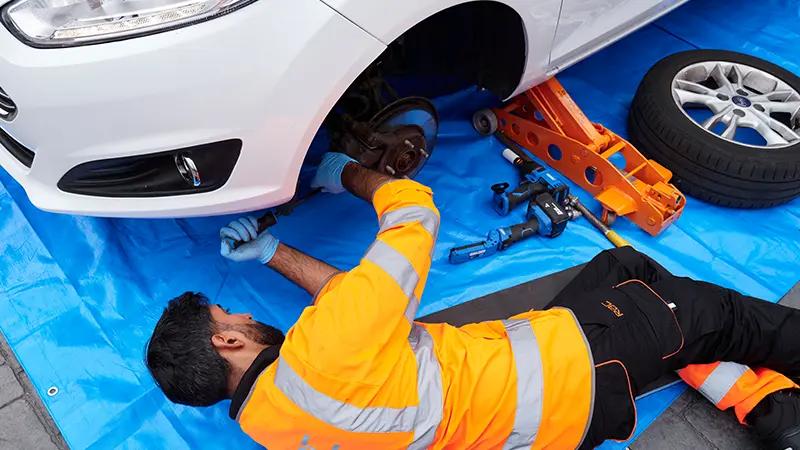Why choose the RAC for a full & interim service
At the RAC, we've got over 125 years' experience helping UK drivers. So giving our members service they can trust matters. That's why we offer full and interim services from our RAC Approved Garages and RAC Mobile Mechanics. Our professional mechanics have the expertise and experience to make sure your vehicle is operating safely and efficiently – results you can rely on at a price you can afford.
Plus, with RAC Mobile Mechanics, you can avoid the hassle of taking your vehicle to a garage. They can do full and interim services on your driveway, so you don't even need to leave the house.

RAC Mobile Mechanic

At the RAC, we’ve got over 125 years’ experience in offering complete peace of mind to our members. We’re best known for our breakdown service. And now – our new RAC Mobile Mechanics are here to help make every day motoring more convenient and easier. If you need a service or repair, they’ll come to you at your home or work.

Full service
A comprehensive set of checks to make sure your car’s safe and working correctly. Depending on your vehicle, it can take up to 1hr 30 minutes. Recommended every 12 months or 12,000 miles.

Interim service
A series of checks to keep your car running smoothly between full services. It should take around 1 hour.

Oil & filter change
It’s important to get your oil changed regularly, to make sure your engine is running efficiently and prevent damage. It's recommened you change it every 6,000 miles. It should take us around 50 minutes.
Average cost of a full service by car make^
The cost of a full service will depend on the car you drive, but it’s generally higher than an interim service. According to RAC data, the average cost of a full car service is £260. But you can check out the average price of a full car service for your specific car make here.
Make | Average Price |
424 | |
378 | |
333 | |
311 | |
286 | |
203 | |
187 | |
183 | |
178 | |
177 |
^Average price quoted for RAC Mobile Mechanics from 01/01/25 to 31/03/25.
Average cost of a full service by location^
Below you’ll find the average price of a full car service for a range of popular locations. With our mobile mechanics, the price we quote includes parts, labour and VAT. And you can spread the cost with Klarna1. Remember, if you get a quote from a garage, the price quoted may vary depending on labour rates, parts, and other factors.
Location | Average Price |
115 | |
109 | |
89 | |
89 | |
88 | |
83 | |
83 | |
77 | |
76 | |
76 |
^Average price quoted for RAC Mobile Mechanics from 01/01/25 to 31/03/25.
Content Guide
What’s included in a full service
A full service is comprehensive with various checks that maintain your vehicle's health and enhance its performance. It typically includes:
- Oil change
- Checks for any leaks, along with an oil and filter change.
- Safety Features
- Seatbelts and airbag systems are tested to check they’re working.
- Windscreen wipers and washers are inspected to ensure clear visibility under all weather conditions.
- Fluid Levels
- All essential fluids are checked and topped up if necessary, including coolant, power steering fluid, and windshield washer fluid.
- Additional Checks
- Exhaust system is checked for leaks or damage.
- Suspension parts are evaluated to make sure they’re in good condition.
This comprehensive service helps improve your vehicle’s reliability and its safety features, so that you can drive with peace of mind..
It’s important to remember that different garages or mechanics may vary what they can do during a service. You should speak to your mechanic to find out what they’re going to do.
What's included in an interim service
An interim service is designed for high-mileage vehicle users or those who require more frequent checks to keep their vehicle safe and performing at its best. It’s especially useful for drivers covering significant distances each year. It typically includes:
- Oil change
- Checks for any leaks, along with an oil and filter change.
- Tyres and Brakes
- Tyres are checked for tread depth and wear patterns, and their pressure is adjusted to the right level.
- A thorough inspection of brake pads, discs, and fluid levels.
- Safety Features
- Seatbelts and airbag systems are tested to check they’re working.
- Windscreen wipers and washers are inspected to ensure clear visibility under all weather conditions.
It’s important to remember that different garages or mechanics may vary what they can do during a service. You should speak to your mechanic to find out what they’re going to do.
This service is a terrific way to keep your vehicle in check between full services. It also makes sure that all major systems remain in good working condition and can pick up issues before they become serious.
Full service vs. interim service
Understanding the differences between full and interim services can help you decide which is best for your vehicle’s needs:
Frequency and depth
- Full service: Recommended annually for average or low-mileage drivers, a full service is a set of comprehensive checks, addressing every major system in your vehicle with detailed inspections and recommends replacements for parts that have worn. It’s ideal for making sure your car remains in tip-top condition year-round.
- Interim service: Best for high-mileage drivers, typically recommended every six months or between full services. It focuses on the essentials that are most likely to suffer from extensive use, such as oil, with less comprehensive checks compared to a full service.
Purpose and suitability
- Full service: Provides a deep dive into your vehicle’s condition, ideal for catching potential issues before they require expensive repairs.
- Interim service: Acts as a preventative measure, maintaining the reliability and safety of your vehicle between more thorough checks. It’s suited for drivers who use their vehicle intensely and require frequent maintenance.
Benefits and Considerations
- Full service: While more costly, it’s an investment in the longevity of your vehicle, potentially saving you money on future repairs and preserving the car’s resale value.
- Interim service: More affordable and less time-consuming than a full service, it keeps your vehicle safe and performing well, especially if you’re clocking a lot of miles in a brief period.
Each service type offers unique benefits and suits different driving habits and vehicle use. Choose the right one based on how much you drive, the conditions you drive in, and how you want to manage maintenance costs over time.
Remember, different mechanics and garages offer different services. Talk to your mechanic to find out what they will do.
Frequently Asked Questions on Full and Interim Services
A full service is thorough. It includes checking and replacing the engine oil and all filters. It also involves inspecting brakes, tyres, lights, and exhaust systems. Safety features like seatbelts and airbags are tested. The suspension, steering, and battery are assessed too. Check the specifics to know what your mechanic includes. A full service makes sure every key system in your car is optimised for performance and safety.
Usually, a full service is needed once a year or every 12,000 miles, whichever comes first. This depends on what your car’s manufacturer says, so check your owner’s manual or ask your service provider for advice.
An interim service includes changing the engine oil and oil filter. Essential fluids are topped up, and key components like tyres, lights, and wipers are checked. It’s designed to keep your car safe and reliable between full services, especially if you drive a lot each year.
For frequent drivers, an interim service should be every 6 months or every 6,000 miles. This helps make sure that often used cars stay in good condition.
A full service is more detailed and includes a complete list of checks and recommendations for part replacements. An interim service focuses on the essentials to keep your car running safely and efficiently between full services.
Combining a full service with an MOT can be very useful. It makes sure your car meets legal safety and emissions standards and is in top condition. This combination is cost-effective, convenient, and reduces the need for multiple garage visits.
Browse other top locations and makes across our network in the UK
Filter by

